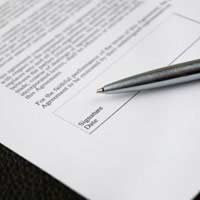How Witness Statements are Used

There is no general requirement for a party in a small claims trial to use a witness statement. However, in some small claims cases the court may give directions that witness statements are to be produced.
The Purpose of Witness Statements
A witness statement gives a party or witness the opportunity to set out their version of the facts of a case in a calm and considered way. They can take as much time as they want to make sure that everything is included. The witness statement should include all the information that the judge needs to reach the right decision in the case.A witness statement should be a statement of all the facts that a witness knows about the claim. If the witness is stating something that they believe to be true they should specify this and say why they have this belief. A witness statement is not the place for arguments or opinions – only those facts that the witness knows to be true.
Service of Witness Statements
If a party intends to rely on a witness statement they must send a copy to the other side and to the court prior to the hearing. If the court has given any special directions requiring the parties to produce witness statements, the statements should be served in accordance with those directions.Format of Witness Statements
The Civil Procedure Rules give detailed guidance on the required format for witness statements. These requirements do not strictly apply to small claims trials and a judge is likely to give a litigant in person some leeway if they produce a witness statement. However, a witness statement will be of far more use to the court, and more credible, if it follows the guidelines. In particular, a witness statement should:- Contain the full name and address of the witness and explain their involvement with the case;
- Make clear whether the witness knows a statement to be true or just believes it to be true;
- Be clearly typed, or written – preferably on only one side of the paper. Pages should be paginated and fastened together;
- Be divided up into numbered paragraphs;
- Set out the facts in a logical - probably chronological - order;
- Refer to and clearly identify any exhibits attached to the witness statement;
- Contain a statement of truth;
- Be signed by the witness.
Use of Witness Statements in a Small Claims Hearing
Small claims hearings are usually given relatively short time slots. If a party has produced a witness statement the judge will have a good idea of their case before the hearing starts. Even if he has not had the chance to read the witness statement before the trial, it will still be quicker for the judge to read the witness statement than to elicit the same information from the witness or party during the course of the hearing.The judge is likely to ask the witness some questions about their witness statement. He may want the witness to confirm that the statement is theirs, that the signature on it is theirs and that it gives a true account of the facts of the case. The judge may also ask questions which expand on the information contained in the witness statement.
The other side may be invited to ask any questions they have, arising out of the witness statement. Traditionally the other side will seek to cast doubt on any facts which damage their case or support the case of the party who has produced the witness statement.
Failure of a Witness to Attend the Hearing
It is quite common for a party to produce a witness statement for a small claims case but for the witness not to attend the hearing. If a witness fails to attend, his evidence cannot be challenged by the other side. In these circumstances it is open to the judge to take into account the witness’s failure to attend when he decides how much weight to give to his evidence.The small claims procedure states that a party to a small claims case can write to the court asking for the case to be heard in their absence, based on the written evidence provided. If they do so the judge will take any witness statements into account when reaching a decision on the case.
Business energy with a difference
Looking for better business energy options? Whether it’s advanced monitoring, new connections, or adjusting capacity, our sponsor, Purely Energy can help.
📞 Call 0161 521 3400 or simply send us your details below for a no-obligation chat.
Sponsored by Purely Energy
Purely kindly sponsors this site. They help businesses deal with all aspects from securing the lowest prices, capacity upgrades, usage monitoring using their proprietory software, Purely Insights, and many other aspects. Need help with your commercial energy? Enter your details below and they’ll get back to you.



